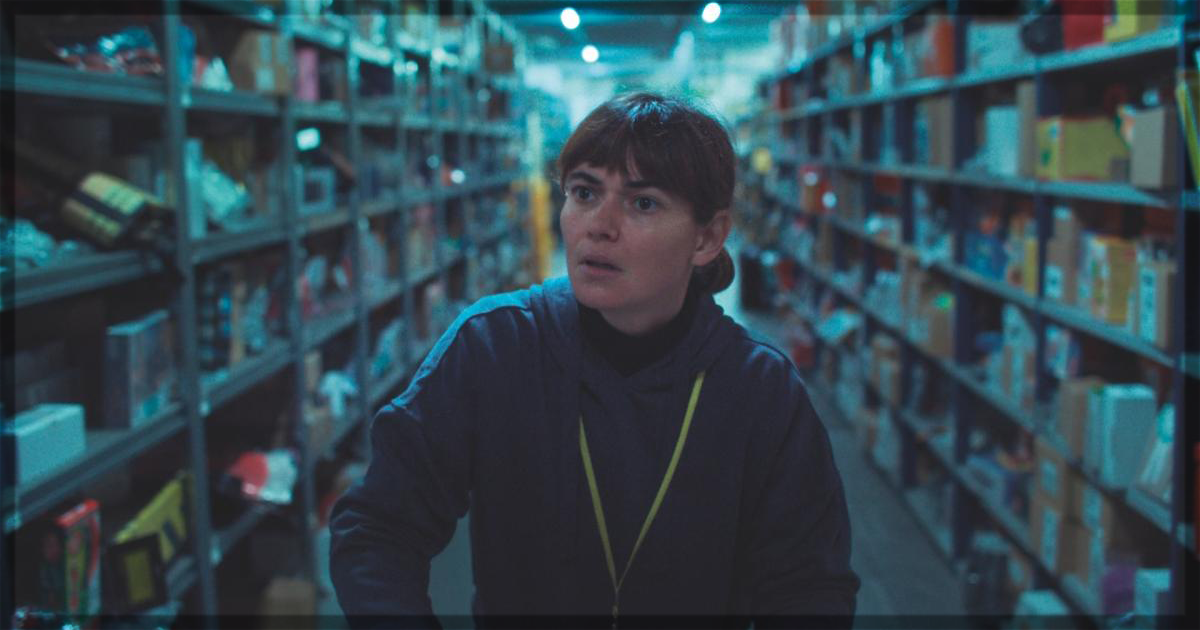In her debut feature, On Falling, the Portuguese director Laura Carreira uses her life experience to portray the migrant experience. Born in Porto, Portugal, but living in Edinburgh, Scotland, she presents a social drama about immigration. She narrates the story of Aurora (Joana Santos), a Portuguese woman living in the Scottish capital. She works in a logistical warehouse, similar to an Amazon one, but the director does not specify the company. Aurora works long shifts and performs well as a product picker. She lives with other immigrants in a shared flat, where she rents a room. Her tight and repetitive routine changes when she breaks her phone screen and needs to pay for its repair. Suddenly, her finances dwindle, and Aurora abdicates from eating to survive in the city.
Produced by the legendary director Ken Loach through his company Sixteen Films, Carreira approximates the British director thematically. She dives into the intricacies of the late stage of capitalism, where humans have to supply machines that deliver products constantly. The Portuguese director builds a discursive bridge between the exploitation of the working class and immigration. Those who need documentation to secure a temporary visa and status expose themselves to poor working conditions. Her characters converse about getting another job and dreaming about a profession where they could sit all day. The subtext on the necessity of labor to survive in a metropolitan environment is a clever discussion of working-class conditions. The topics are likely the strongest link to the two-time Palme d’Or winner, Loach. His films criticize the rotten core of the social system within governments that are supposed to protect the workers. Even though they are left-leaning filmmakers using social realism to study characters. Visually, Loach goes for a rawer aesthetic than the young Portuguese author.
The core of this story is a subtle performance by Joana Santos. Her character is empathetic toward others and friendly to talk to, but she puts herself in long work shifts. Thus, she does not engage in activities outside her flat and has difficulty growing relationships with others. In this sense, a crucial element in establishing the film’s structure is through a cyclical disposition. Every day, Aurora does the same things: wakes up, works, and gets a ride home with Vera (Inês Vaz). Her performance is essential to pace and immerse the audience in the script arrangement. Hence, as Aurora faces hunger and despair through financial limitations, Santos communicates the difficulties of those situations through her body language. Her back arches, her facial expression changes, and her eyes lose themselves in the pains of daily life. Therefore, the film surrounds itself with her performance and the development of her situation.
Carreira invests time showing her lead character in different events that return to a simple answer: her work. She does not go out, party, or date because of the warehouse gig. She is too tired of going around massive industry plants picking up inutilities bought by other people. The only thing she meets at the end of the night is exhaustion. The director constructs a raw and accurate portrayal of the modern corporate world and how it treats its working-class employees. The director shows her irony through a dialogue between Aurora and her manager, in which he praises her for a top performance. Her reward is a chocolate bar. She does not earn a money bonus or a day off, but a small bar.
Accordingly, the director demonstrates the exploitation through other scenes, such as when Aurora steals a cupcake due to her lack of money to buy lunch. Instead of support from a superior, Aurora must stay at the event and hear coordinated human resources phrases to motivate employees. It is a dichotomy of how capitalism works, providing faux support to its partners and subjecting them to problematic conditions. The film does not develop sub-plots or characters other than Aurora, but it still thrives in connecting the audience with her co-workers, who suffer as much, and most are immigrants too. Carreira leans toward globalization and its supply chain, where countries exchange products and workers. Still, those not trained enough get high-demanding physical jobs with a ridiculous wage. It is not enough to escape the spiral of poverty and exploitation.
In her first full-length effort, Laura Carreira borrows the social realism style from directors such as Andrea Arnold, Jean-Pierre & Luc Dardenne, and Ken Loach to develop her view on the world’s miseries. Her On Falling delivers a brilliant performance by Portuguese actor Joana Santos, anchoring a substantial study of a person’s survival drive.
On Falling is available on digital and demand.
Learn more about the film at the IMDB site for the title.


